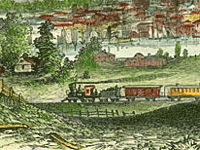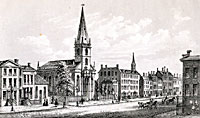
View of Albany NY from Greenbush (closeup)

View of Broadway (Trinity Church and City Hotel)
According to journalist Henry Villard, “leveed and receptioned by remorseless ladies and gentlemen. Safe in bed at last, too annoyed and angered to sleep, no wonder Mr. And Mrs. Lincoln departed from Albany with feelings of gratitude for their safe deliverance [from the hubbub, confusion and the jostling crowds], and with resolutions never to return thither again.”1 According to Victor Searcher, the entourage made the trip on a brand new train built specially for the trip. “Inside, crimson plush walls were offset by blue silk panels studded with silver stars. The light one of the tapestry carpet contrasted with black walnut furniture upholstered in blue mazarine cloth trimmed in tri-colored gimp braid and tassels. Four splendid lounges, and for each of arm and reading and parlor chairs, offered luxurious comfort.”2
“Mr. Lincoln’s progress from Albany to New York was a continued ovation. All the people of different localities round the railway stations turned out to welcome him with their vivats, and do honor to the brave old rail splitter,” reported the New York Illustrated News.3 Five stops were made along the way — at Troy, Hudson, Poughkeepsie, Fishkill and Peekskill. John W. Starr wrote in Lincoln and the Railroads: “Troy was reached a few minutes after nine o’clock, a crowd of about thirty thousand people awaiting the special. After a brief address by Lincoln the party boarded the train of the Hudson River Railroad awaiting, and left after a stop of thirty minutes.”4
At Troy, President-elect Lincoln said: “I am here to thank you for this noble demonstration of the citizens of Troy, and I accept this flattering reception with feelings of profound gratefulness. Since having left home, I confess, sir, having seen large assemblages of the people, but this immense gathering more than exceeds anything I have ever seen before. Still, fellow citizens, I am not so vain as to suppose that you have gathered to do me honor as an individual, but rather as the representative for the fleeting time of the American people. I have appeared only that you might see me and I you, and I am not sure but that I have the best of the sight.”5
Contemporary biographer Josiah G. Holland: “He was not permitted to pass by Poughkeepsie without a formal welcome from the mayor of that city, to which he made a formal response. In this little speech there is manifest improvement upon the earlier efforts of the route. Mr. Lincoln had found that there were things to talk about besides policy, and that it was better to yield himself up to the impulse of the moment than to be under the constant fear of saying some imprudent thing, concerning the character of the crisis and the policy of the incoming administration.”6 President-elect Lincoln’s most extensive remarks along the Hudson River corridor were made at Poughkeepsie where he said:
I cannot expect to make myself heard by any considerable number of you, my friends, but I appear here rather for the purpose of seeing you and being seen by you. (Laughter.) I do not believe that you extend this welcome — one of the finest I have ever received to the individual man who now addressed you but rather to the person who represents for the time being the majesty of the constitution and the government. (Cheers.) I suppose that here, as everywhere, you meet me without distinction of party, but as the people (Cries of ‘yes,’ ‘yes.’) It is with your aid, as the people, that I think we shall be able to preserve — not the country, for the country will preserve itself, (cheers), but the institutions of the country — (great cheering); those institutions which have made us free, intelligent and happy — the most free, the most intelligent and the happiest people on the globe. (Tremendous applause.) I see that some, at least, of you are of those who believe that an election being decided against them is no reason why they should sink the ship. (‘Hurrah.’) I believe with you, I believe in sticking to it, and carrying it through; and, if defeated at one election, I believe in taking the chances next time. (Great laughter and applause.) I do not think that they have chosen the best man to conduct our affairs, now — I am sure they did not — (here the speaker was interrupted by noise and confusion in another part of the crowd) — but acting honestly and sincerely, and with your aid, I think we shall be able to get through the storm. (Here Mr. Sloan caught hold of Mr. Lincoln’s arm and pulled him around to see the locomotives — the Union and Constitution — which passed gaily dressed with flags. Turning hastily, Mr. Lincoln continued) — In addition to what I have said, I have only to bid you farewell. (Cheers and a salute, amid which the train moved on.)7
For one member of the traveling party, Poughkeepsie was not the best stop. Travelers seeing Mrs. Lincoln asked to see her children as well “Tad was tiring of the trip toward the end, and although he enjoyed watching the skaters on the Hudson, by the time they reached Poughkeepsie he lay down on the floor and said he would not make any more appearances. Robert alone responded when the window was opened to return salutations. But the crowd wanted to see the others boys, and finally Mrs. Lincoln appeared and apologetically explained that Tad was not in the mood to be shown off,” wrote Ishbel Ross, biographer of Mary Todd Lincoln.8
A stop was made at Fishkill where the President delivered a brief address: “I appear before you not to make a speech. I have no sufficient time, if I had the strength, to repeat speeches at every station where the people kindly gather to welcome me as we go along. If I had the strength, and should take the time, I should not get to Washington until after inauguration, which you must be aware would not fit exactly. (Laughter.) That such an untoward event might not transpire. I know you will readily forego any further remarks; and I close by bidding you farewell.”9
A last stop before New York City was made at Peekskill. New York Republican politician Chauncy M. Depew recalled: “While Lincoln was on his way to Washington for his inauguration, we at Peekskill succeeded in having his consent to stop there and make a brief speech. Thousands gathered at the station, many have driven over from Connecticut, twenty-five miles away. The chairman of the reception committee was Judge Nelson, then past eighty years of age, who had served in Congress with Lincoln. The President-elect stepped onto an extemporized platform and was introduced to the committee, and then the judge began the speech of welcome.”10
Mr. Lincoln said: “I have but a moment to stand before you, to listen to and return your kind greeting. I thank you for this reception, and for the pleasant manner in which it is tendered to me, by our mutual friend. I will say in a single sentence, in regard to the difficulties that lie before me and our beloved country, that if I can only be as generously and unanimously sustained as the demonstrations I have witnessed indicate I shall be, I shall not fail; but without your sustaining hands I am sure that neither I, nor any other man, can hope to surmount these difficulties. I trust that in the course I shall pursue I shall be sustained, not only by the party that elected me, but by the patriotic people of the whole country.”11
According to Chauncey M. Depew, “The crowd was wild to hear Mr. Lincoln, but the judge continued speaking until the bell of the locomotive rang and the conductor shouted: ‘All Aboard!’ Mr. Lincoln hastily jumped on the platform of the car, laughing heartily at the speaker, whose arms were gesticulating, and whose closing sentence was half finished, while the audience cheered frantically and then roared with rage at the judge.”12
Footnotes
- Henry Villard, Lincoln on the Eve of ‘61, p. 96.
- Victor Searcher, Lincoln’s Journey to Greatness, p. 170.
- New York Illustrated News, February 1861, .
- John W. Starr, Jr., Lincoln and the Railroads, p. 187.
- Roy P. Basler, editor, The Collected Works of Abraham Lincoln, Volume IV, p. 227 (Troy Daily Budget, February 19, 1861).
- Josiah G. Holland, Life of Abraham Lincoln, p. 267.
- Roy P. Basler, editor, The Collected Works of Abraham Lincoln, Volume IV, p. 228-229 (New York Herald, February 20, 1861).
- Ishbel Ross, The President’s Wife: Mary Todd Lincoln, p. 94-95.
- Roy P. Basler, editor, The Collected Works of Abraham Lincoln, Volume IV, p. 229 (New York Tribune, February 20, 1861).
- Emanuel Hertz, Lincoln Talks, p. 189 (Chauncey Depew, Collected Speeches).
- Roy P. Basler, editor, The Collected Works of Abraham Lincoln, Volume IV, p. 229 (New York Herald, February 20, 1861).
- Emanuel Hertz, Lincoln Talks, p. 189 (Chauncey Depew, Collected Speeches).







